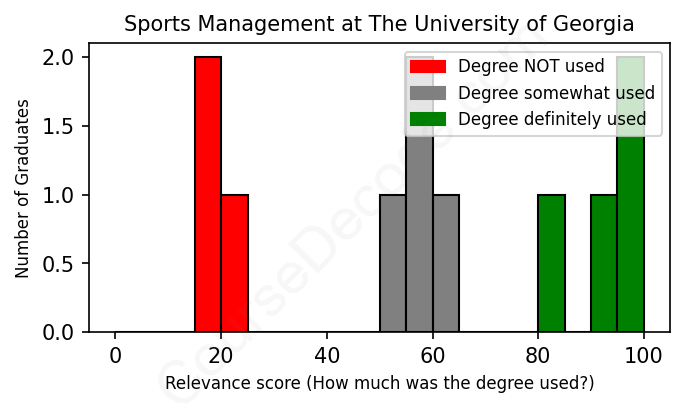
First, some facts. Of the Sports Management graduates from The University of Georgia we've analyzed , here's how many have used (or NOT used) their degree in their career:

These are estimates based on AI analysis of 11 LinkedIn profiles (see below).
The verdict? Below average. Overall, with an average relevance score of 59%, Sports Management graduates from The University of Georgia have a lower likelihood (-8%) of finding work in this field compared to the average graduate across all fields:
And for comparison, here's the chart for all profiles we've looked at across all degrees.
Also, after graduating, 45% of these graduates have pursued further education other than another Bachelor's degree (such as a Masters degree or other), compared to the average across all profiles of 35%. This suggests you may need more than just a Bachelors degree to be competitive as a Sports Management graduate.
See the details:
|
Relevance score: 50% We think this person has gone into a career only somewhat relevant to their degree. We think this person has gone into a career only somewhat relevant to their degree.
DEGREE INFOGraduated in 2011 from The University of Georgia with a Bachelor's degree in Sports Management. No other secondary education since. JOB HISTORY SINCE GRADUATIONAgent Nationwide Insurance Apr 2012 - Mar 2013 Financial Advisor  Edward Jones May 2013 - Present ABOUTNo information provided. |
The top 10 most common jobs done by the graduates we've analyzed (ranked most common to least) are:
When looking at the career paths of people who've graduated in Sports Management from The University of Georgia, it's clear that there are a few common types of roles. Many of the jobs, particularly those in sales and administrative support within sports organizations, like Ticket Sales Account Executive or Athletics Administrative Assistant, do provide some relevant experience, but generally rely more on transferable skills than specific sports expertise. You’ll find a mix of people working directly in sports—which is great!—and those who end up in roles that feel pretty far removed from the sports world, such as financial advising or health services management. A good chunk of them end up in jobs that, while they might use some skills gained during their degree, don’t really dive deep into the core of sports management itself.
On the flip side, there are definitely individuals who land roles that are highly relevant, like Graduate Assistants or roles within athletic programs where they are directly engaged with sports teams or events. These positions utilize a lot of the skills you’d expect from a sports management degree, focusing on the dynamics of sports environments and the intricacies of team operations. So, while some went on to jobs that align closely with their studies, many are either in roles that don’t directly apply their sports knowledge or have shifted into other fields altogether. It’s a mixed bag, really, with some super exciting roles in the sports industry and others where the connection is a bit more tenuous.
Here is a visual representation of the most common words in job titles for Sports Management graduates (this is across all Sports Management graduates we've analyzed, not just those who went to The University of Georgia):

When we look at the career paths of graduates from The University of Georgia with a degree in Sports Management, there's a pretty interesting mix. Many of the first jobs they land right after graduation are often in sports or related fields, which makes sense considering their education. For example, graduates have taken roles like personal trainers, account executives for sports teams, and interns within sports organizations. It seems like a solid foundation, with a good chunk starting in positions that allow them to gain essential experience and network within the sports community.
Fast forward a few years, and the trajectories start to differ a bit. While some folks move up within the sports world—like those who transitioned from internships to full-time positions at major sports teams—others veer off into more general business roles or completely different industries altogether. For instance, we see some graduates landing roles in sales or finance, which may or may not have a direct tie to their degree. However, there are definitely alumni who are thriving in the sports sector years down the line, taking on roles like Director of Player Development or Ticket Sales Account Executive. So, it seems like while not every graduate stays within sports, a significant number do find rewarding careers in the field. Overall, the degree gives them a pretty strong launch pad, even if the outcomes vary widely for each individual.
Honestly, a Bachelor’s degree in Sports Management can be a mixed bag, and how hard it is really depends on your interests and strengths. At the University of Georgia, you’re looking at a program that combines business principles with sports, which means you'll likely encounter subjects like marketing, management, and finance, as well as some classes specific to the sports industry. If you’re passionate about sports and are good with teamwork and communication, you might find it more manageable. But if you’re not so into those business concepts, it could feel a bit tougher. Overall, it’s generally considered to be on the easier side compared to some of the more intense STEM degrees, but you still need to put in the effort to stay on top of your assignments and projects. Just keep your head down, stay engaged, and it should be a rewarding experience!
Most commonly, in the LinkedIn profiles we've looked at, it takes people 3 years to finish a Bachelor degree in Sports Management.
So, checking out the career paths of these UGA Sports Management grads, it looks like they’ve had a pretty mixed bag when it comes to making decent money. The ones who graduated in 2010 and 2011 seem to have secured some solid roles, especially those who became business owners or landed positions in management, which likely comes with a decent paycheck. However, others like those who graduated more recently (2020-2023) are still working their way up and seem to be landing mostly entry-level or internship-style gigs, which typically don’t pay all that much at first. Overall, while some are definitely on track to earn good money, others are still hustling to build their careers and financial stability.
Here is a visual representation of the most common words seen in the "about" section of LinkedIn profiles who have a Bachelor degree in Sports Management (this is across all Sports Management graduates we've analyzed, not just those who went to The University of Georgia). This may or may not be useful:

Here are all colleges offering a Bachelor degree in Sports Management (ordered by the average relevance score of their Sports Management graduates, best to worst) where we have analyzed at least 10 of their graduates: